 Both Catahoula Cur and YorkiePoo are originated from United States. Catahoula Cur may grow 46 cm / 19 inches higher than YorkiePoo. Catahoula Cur may weigh 43 kg / 95 pounds more than YorkiePoo. Both Catahoula Cur and YorkiePoo has almost same life span. Catahoula Cur may have more litter size than YorkiePoo. Catahoula Cur requires Low Maintenance. But YorkiePoo requires Moderate Maintenance
Both Catahoula Cur and YorkiePoo are originated from United States. Catahoula Cur may grow 46 cm / 19 inches higher than YorkiePoo. Catahoula Cur may weigh 43 kg / 95 pounds more than YorkiePoo. Both Catahoula Cur and YorkiePoo has almost same life span. Catahoula Cur may have more litter size than YorkiePoo. Catahoula Cur requires Low Maintenance. But YorkiePoo requires Moderate Maintenance
Basic Information
Group:
Herding dogs
Toy dog
undefined
United States
United States
Weight Male:
20 - 48 kg
44 - 106 pounds
Weight Female:
18 - 48 kg
39 - 106 pounds
Life Span:
10 - 14 Years
10 - 15 Years
Other Names:
Catahoula Hound, Catahoula Hog Dog, Leopard Dog
Yorkiepoopoo, yorkapoo, yorkerpoo, yoodle, yorkiedoodle, Porki
Colors Available:
Red- and blue merle, grey-, black, patchwork and brindle
gold, blue, white, and parti-color
Coat:
Short and smooth
smooth coat of silky and wavy hair,
Temperament:
Affectionate, Alert, Cheerful, Courageous, Curious, Energetic, Friendly, Independent, Intelligent, Lively, Loving, Loyal, Outgoing, Playful, Protective, Responsive, Social, Stubborn, Territorial
Affectionate, Alert, Energetic, Gentle, Independent, Intelligent, Loving, Stubborn
Grooming:
Low Maintenance
Moderate Maintenance
New Owners Friendly:
Yes
Yes
History
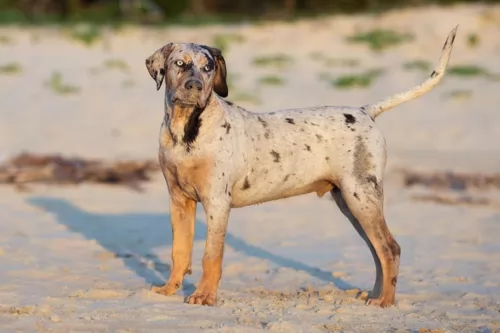 The Catahoula Cur is also known as the Catahoula Leopard Dog or the Louisiana Catahoula. The dog hails from Louisiana, United States.
The Catahoula Cur is also known as the Catahoula Leopard Dog or the Louisiana Catahoula. The dog hails from Louisiana, United States.
It is thought that the Catahoula Cur or Catahoula Hound as it is also known, used to be a hunting dog. The first settlers in Louisiana needed a strong dog to help them with hunting wild hogs and they bred their dogs with other dogs belonging to the locals. This gave them a strong, resilient dog that could take on the wild hogs and also protect their livestock.
Dogs who have no doubt been brought into the mix to produce the Catahoula Cur are mastiffs, Beaucerons, sighthounds and wolves.They are today more commonly referred to as Catahoula Leopard Dogs.
The YorkiePoo is a hybrid cross between a toy Poodle and a Yorkshire Terrier. These two breeds are extremely popular as therefore so is the crossbreed. Yorkiepoos were developed a little over ten years ago in the United States. They were developed as hypoallergenic toy dogs that are easy to take care of.
They are toy sized, healthy and calm. Each pup is different from the others depending upon the characteristics they develop from their parents and across multi-generational breeding. They are small watch dogs and bark for intruders. It is believed they were developed sometime in the past twenty years or so.
Description
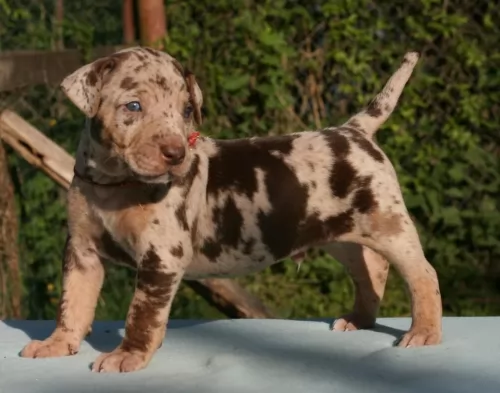 There are varying sizes for Catahoulas and a typical height is 51–66cm and weighing anything from 18 – 51kg. These Cathoula Cur’s come in different colors too, but the leopard-like coat is a dominant feature with this dog.
There are varying sizes for Catahoulas and a typical height is 51–66cm and weighing anything from 18 – 51kg. These Cathoula Cur’s come in different colors too, but the leopard-like coat is a dominant feature with this dog.
While there are solid colors, you can expect red- and blue merle, grey-, black, patchwork and brindle too.
The length of the coat varies somewhat too and while the coat is essentially short and smooth, there are Catahoulas where the coat is a little longer and more coarse.
The eyes of the Catahoula Cur are another interesting feature and both eyes can be the same color, but in some instances the one eye can be brown while the other could be blue, green or gray. The ears of the Catahoula Cur are medium in size and are floppy, dropping down close to the head.
Temperament:
The Catahoula Cur is an intelligent dog and also active and full of sports. You can’t call this dog aggressive, but merely assertive, being strong-willed. He is also affectionate and loyal, loving to spend time with his human family.
He makes a wonderful family pet, complete with children as well as other pets in the home, more so when he has been trained and socialized. These dogs are bright and alert and they also make excellent watch dogs. People who have owned a Catahoula Cur will tell you that these are wonderful pets, full of life and personality.
The YorkiePoo was developed with the Yorkshire Terrier and the Toy Poodles. Some are now being bred with miniature poodles instead. This has created some variety in the size of the YorkiPoos. Serious breeders have stuck with the toys so that there will be more consistency and reliability in the cross breed.They are small watch dogs and bark for intruders
Characteristics
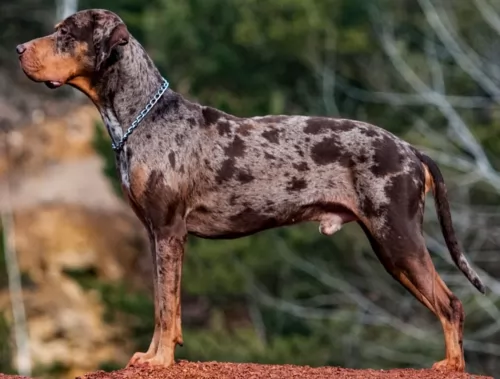 Catahoula dogs are the kind of dogs that make perfect family pets as they are all rounders. They’ve got characteristics that everybody wants in a dog. They are naturally protective, even they are not described as aggressive dogs. With training and socialization they get on well with children as well as other pets in the home. He is alert and territorial, which makes him a good watchdog, more so because he doesn’t particularly like strangers.
Catahoula dogs are the kind of dogs that make perfect family pets as they are all rounders. They’ve got characteristics that everybody wants in a dog. They are naturally protective, even they are not described as aggressive dogs. With training and socialization they get on well with children as well as other pets in the home. He is alert and territorial, which makes him a good watchdog, more so because he doesn’t particularly like strangers.
Intelligent and independent, training makes him wonderfully obedient and relaxed. However, give him the chance for ball games and a walk, and he is more than ready.
He is used to being a guard- and hunting dog, and this makes him an active, energetic dog. You will need to give him plenty of activities if you don’t want this amicable dog becoming anxious, frustrated and destructive.
Exercise him well, provide him with nourishing, top quality food together with fresh water and shower him with the love and attention he deserves as a family member. You’ll also join the ranks of Catahoula Cur owners who want to tell others about what an awesome pet he makes.
Children friendliness yes be careful young children don’t hurt him
2.Special talents intelligence and bold nature
3.Adaptability can live anywhere
4.Learning ability very high unless negatively reinforced then stubborn
Health Problems
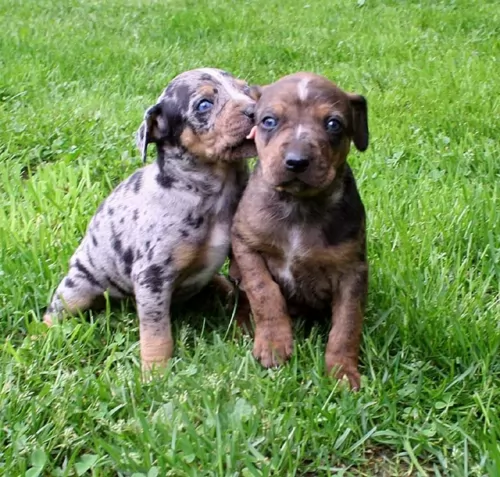 When you buy a Catahoula Cur, you can know that your pet is going to be fairly healthy, however there will be some common health issues to look out for, and by knowing about these health concerns, you can be better prepared.
When you buy a Catahoula Cur, you can know that your pet is going to be fairly healthy, however there will be some common health issues to look out for, and by knowing about these health concerns, you can be better prepared.
Typical Infections:
Your Catahoula Cur will be susceptible to some bacterial and viral infections which can be life threatening for him if he gets them. Some of these are parvo, distemper and rabies. That is why it is important to have your pet vaccinated, which can start at about 8 weeks of age for a puppy.
Obesity:
Obesity is a world-wide problem with humans and with their pets and it can open up a whole lot of problems with your pet’s health that he otherwise might not have got. It can play havoc with your pet’s digestion, and it can cause joint problems too.
It can be so tempting to pop a sweet treat into your pet’s mouth because you love him so much, but get to know what foods can actually be hazardous for him.
Like most designer or hybrid breeds, the general health of the YorkiePoo is pretty good. They are prone to some illness however that their parents might have. This might include:
• Hip dysplasia – can lead to lameness.
• Elbow dysplasia – can lead to lameness.
• Von Willonbrand’s Disease
• Epilepsy
• Patellar Luxation – slipped kneecaps can lead to lameness.
• Hypothyroidism – causes lethargy, skin issues.
• Thrombopathia
• Atopic dermatitis – should be treated right away.
• PSS Portosystemic Shunt – stunted growth, seizures, abnormal behavior.
Caring The Pet
Grooming:
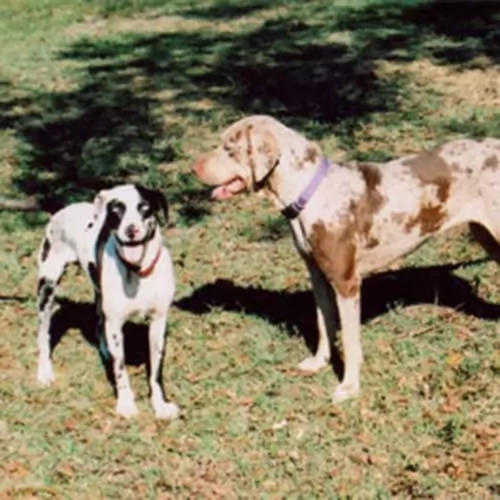 Your Catahoula Cur isn’t a high maintenance dog and a good brushing 2 times a week will keep his leopard coat looking shiny and free of loose hairs.
Your Catahoula Cur isn’t a high maintenance dog and a good brushing 2 times a week will keep his leopard coat looking shiny and free of loose hairs.
Catahoula’s have good teeth, and you want to keep them that way by brushing them at least 2 or 3 times a week to prevent dental decay and a host of other medical issues.
1Feeding the puppy toy high quality puppy kibble feed 3-4x day
2.Feeding the adult toy high quality adult kibble feed 2x day
3.Points for Good Health -
4. Games and Exercises agility, obedience are great for this hybrid. They need social interaction and stimulation.
Comparison with other breeds
- Catahoula Cur vs English Bulldog - Breed Comparison
- Catahoula Cur vs German Shepherd - Breed Comparison
- Catahoula Cur vs Golden Retriever - Breed Comparison
- Catahoula Cur vs Labrador Retriever - Breed Comparison
- Catahoula Cur vs West Highland White Terrier - Breed Comparison
- Catahoula Cur vs French Bulldog - Breed Comparison
- Catahoula Cur vs Beagle - Breed Comparison
- Catahoula Cur vs Yorkshire Terrier - Breed Comparison
- Catahoula Cur vs Poodle - Breed Comparison
- Catahoula Cur vs Rottweiler - Breed Comparison
- Catahoula Cur vs Boxer - Breed Comparison
- Catahoula Cur vs English Pointer - Breed Comparison
- Catahoula Cur vs Siberian Husky - Breed Comparison
- Catahoula Cur vs Doberman Pinscher - Breed Comparison
- Catahoula Cur vs American Bully - Breed Comparison
- Catahoula Cur vs Abruzzenhund - Breed Comparison
- Catahoula Cur vs Affenpinscher - Breed Comparison
- Catahoula Cur vs Afghan Hound - Breed Comparison
- Catahoula Cur vs Aidi - Breed Comparison
- Catahoula Cur vs Airedale Terrier - Breed Comparison
- Catahoula Cur vs Akbash Dog - Breed Comparison
- Catahoula Cur vs Akita - Breed Comparison
- Catahoula Cur vs Africanis - Breed Comparison
- Catahoula Cur vs Askal - Breed Comparison
- Catahoula Cur vs Atlas Terrier - Breed Comparison
- YorkiePoo vs English Bulldog - Breed Comparison
- YorkiePoo vs German Shepherd - Breed Comparison
- YorkiePoo vs Golden Retriever - Breed Comparison
- YorkiePoo vs Labrador Retriever - Breed Comparison
- YorkiePoo vs West Highland White Terrier - Breed Comparison
- YorkiePoo vs French Bulldog - Breed Comparison
- YorkiePoo vs Beagle - Breed Comparison
- YorkiePoo vs Yorkshire Terrier - Breed Comparison
- YorkiePoo vs Poodle - Breed Comparison
- YorkiePoo vs Rottweiler - Breed Comparison
- YorkiePoo vs Boxer - Breed Comparison
- YorkiePoo vs English Pointer - Breed Comparison
- YorkiePoo vs Siberian Husky - Breed Comparison
- YorkiePoo vs Doberman Pinscher - Breed Comparison
- YorkiePoo vs American Bully - Breed Comparison
- YorkiePoo vs Abruzzenhund - Breed Comparison
- YorkiePoo vs Affenpinscher - Breed Comparison
- YorkiePoo vs Afghan Hound - Breed Comparison
- YorkiePoo vs Aidi - Breed Comparison
- YorkiePoo vs Airedale Terrier - Breed Comparison
- YorkiePoo vs Akbash Dog - Breed Comparison
- YorkiePoo vs Akita - Breed Comparison
- YorkiePoo vs Africanis - Breed Comparison
- YorkiePoo vs Askal - Breed Comparison
- YorkiePoo vs Atlas Terrier - Breed Comparison
 Petzlover
Petzlover Both Catahoula Cur and YorkiePoo are originated from United States. Catahoula Cur may grow 46 cm / 19 inches higher than YorkiePoo. Catahoula Cur may weigh 43 kg / 95 pounds more than YorkiePoo. Both Catahoula Cur and YorkiePoo has almost same life span. Catahoula Cur may have more litter size than YorkiePoo. Catahoula Cur requires Low Maintenance. But YorkiePoo requires Moderate Maintenance
Both Catahoula Cur and YorkiePoo are originated from United States. Catahoula Cur may grow 46 cm / 19 inches higher than YorkiePoo. Catahoula Cur may weigh 43 kg / 95 pounds more than YorkiePoo. Both Catahoula Cur and YorkiePoo has almost same life span. Catahoula Cur may have more litter size than YorkiePoo. Catahoula Cur requires Low Maintenance. But YorkiePoo requires Moderate Maintenance The Catahoula Cur is also known as the Catahoula Leopard Dog or the Louisiana Catahoula. The dog hails from Louisiana, United States.
The Catahoula Cur is also known as the Catahoula Leopard Dog or the Louisiana Catahoula. The dog hails from Louisiana, United States. There are varying sizes for Catahoulas and a typical height is 51–66cm and weighing anything from 18 – 51kg. These Cathoula Cur’s come in different colors too, but the leopard-like coat is a dominant feature with this dog.
There are varying sizes for Catahoulas and a typical height is 51–66cm and weighing anything from 18 – 51kg. These Cathoula Cur’s come in different colors too, but the leopard-like coat is a dominant feature with this dog. Catahoula dogs are the kind of dogs that make perfect family pets as they are all rounders. They’ve got characteristics that everybody wants in a dog. They are naturally protective, even they are not described as aggressive dogs. With training and socialization they get on well with children as well as other pets in the home. He is alert and territorial, which makes him a good watchdog, more so because he doesn’t particularly like strangers.
Catahoula dogs are the kind of dogs that make perfect family pets as they are all rounders. They’ve got characteristics that everybody wants in a dog. They are naturally protective, even they are not described as aggressive dogs. With training and socialization they get on well with children as well as other pets in the home. He is alert and territorial, which makes him a good watchdog, more so because he doesn’t particularly like strangers. When you buy a Catahoula Cur, you can know that your pet is going to be fairly healthy, however there will be some common health issues to look out for, and by knowing about these health concerns, you can be better prepared.
When you buy a Catahoula Cur, you can know that your pet is going to be fairly healthy, however there will be some common health issues to look out for, and by knowing about these health concerns, you can be better prepared. Your Catahoula Cur isn’t a high maintenance dog and a good brushing 2 times a week will keep his leopard coat looking shiny and free of loose hairs.
Your Catahoula Cur isn’t a high maintenance dog and a good brushing 2 times a week will keep his leopard coat looking shiny and free of loose hairs.